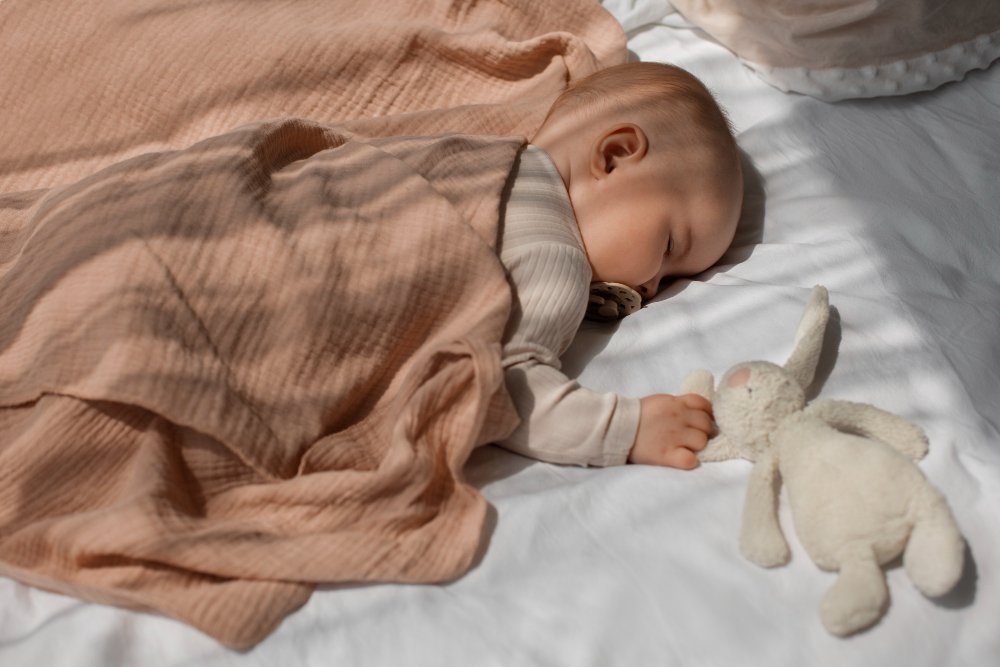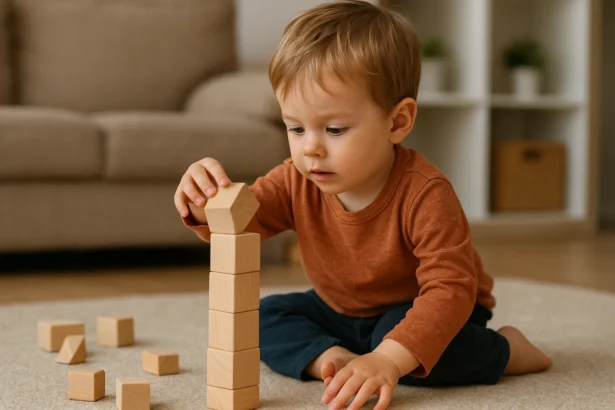It’s both exciting and overwhelming to welcome a new baby into the family. Understanding how newborns sleep is one of the hardest things for parents to deal with.
“Why is my baby awake all night?” and other questions like this — “Is it normal for my newborn to sleep so much?” or “Why does my baby sleep so much?” — are questions that almost all new parents ask.
Sleep is very important for a baby’s growth and development, but the myths about how babies sleep are not true. You can better meet your baby’s needs and ease your own worries by knowing what is normal and what isn’t.
This article talks about the science behind how newborns sleep, what their normal sleep patterns are, common worries, expert-backed advice, and ways to help them get enough sleep.
What Makes Newborn Sleep Different

Newborns do not have fully developed circadian rhythms, which are the body’s internal clocks that tell us when to sleep and wake up. Instead, their sleep is mostly controlled by their biological needs for food, growth, and brain development.
- Short sleep cycles: Adults usually sleep for 90 minutes at a time, but newborns sleep for 50 to 60 minutes at a time. This means they get up more often.
- No difference between day and night: Babies sleep all the time, day or night, until their circadian rhythms develop at about 2–3 months of age.
- A lot of sleep: Newborns sleep 14 to 17 hours a day on average, but they do it in short naps and long stretches.
Parents who want their kids to sleep for long periods of time at night may find these differences annoying, but they are completely normal and necessary for healthy growth.
Normal Sleep Patterns for Newborns

Every baby is different, but most newborns have some common sleep patterns. You can tell what’s normal by looking at these “baseline” patterns.
1. Total Sleep Each Day
- On average, 14 to 17 hours a day.
- Some newborns may sleep as little as 11 hours or as much as 19 hours. If the baby is eating well and gaining weight, both are normal.
2. How Long Each Stretch of Sleep Lasts
- Naps during the day last from 30 minutes to 3 hours.
- At night, you sleep for 2 to 4 hours at a time, but you often wake up to feed.
3. Distribution of Sleep and Wakefulness
- Even spread: In the first month, sleep is pretty evenly spread out between day and night.
- Slow change: By 6 to 8 weeks, a lot of babies start sleeping longer stretches at night.
What Is Normal Sleep for a Newborn?

Here are some common things that parents worry about, but that are usually signs of normal newborn sleep patterns:
- Waking up a lot: Babies need to eat every 2 to 4 hours, even at night.
- Active sleep: Babies often move around, grunt, smile, or suck on things while they sleep. This is a normal stage of sleep called REM sleep, which is very important for the brain to grow.
- Breathing that isn’t regular: When you sleep, your breathing may stop or start at random times. This is usually normal for healthy babies.
- Day-night confusion: For the first few weeks, many newborns sleep more during the day and are awake at night.
When a Newborn’s Sleep Patterns Could Mean Something Is Wrong

There will always be differences, but some sleep habits may need medical advice:
- Too much sleepiness: If your baby sleeps more than 19 hours a day or is very hard to wake up for feedings, talk to your pediatrician.
- Persistent restlessness: If you can’t settle down at all, it could be a sign of reflux, allergies, or another health problem.
- Breathing problems: If you snore loudly, stop breathing for a long time, or gasp for air, you should see a doctor.
- Interference with growth: If sleep is getting in the way of regular feeding or growth milestones, get professional help.
The Science Behind the Stages of Newborn Sleep

There are two main sleep states that newborns go through:
Active Sleep (like REM sleep in adults)
- Babies might move, frown, or make sounds.
- This stage helps the brain grow and learn.
Quiet Sleep (like non-REM)
- Sleep that is deep and restful, with steady breathing.
- Necessary for growth and healing of the body.
Parents often think their babies are awake when they move or make noise because they spend about half of their sleep in active sleep. Recognizing these stages can help you avoid unnecessary breaks.
Things That Affect How Newborns Sleep

1. How to Feed
- Breastfed babies wake up more often because breast milk is digested more quickly.
- Babies who are fed formula might sleep a little longer between meals.
2. Age of the Baby
- 0–6 weeks: Sleep is very irregular, and there is no clear line between day and night.
- 6–12 weeks: Longer stretches of sleep at night start to show up.
- 3–4 months: Rhythms become more regular.
3. The Environment
- Light, noise, and temperature can all affect how well a baby sleeps.
4. Milestones in Development
- Sleep can be disturbed for a short time by growth spurts and changes in the brain.
How to Help Your Newborn Sleep Well

You can’t control every part of your baby’s sleep, but you can make it easier for them to sleep better.
1. Make a Safe Place to Sleep
Experts say:
- Put your baby back to sleep: Always put them on their back to lower the risk of SIDS.
- A firm sleep surface: Use a crib or bassinet with a fitted sheet and no loose bedding.
- Room-sharing: For the first 6–12 months, keep your baby in your room but not in your bed.
2. Encourage the Difference Between Day and Night
- During the day, keep the room bright and busy.
- Turn down the lights and turn down the stimulation at night.
- Even when your baby is still a newborn, stick to a regular bedtime routine.
3. Listen to What Baby Is Saying
- Look for signs of tiredness, like rubbing their eyes, being fussy, or turning away.
- Don’t let babies get too tired, because that makes it harder for them to sleep.
4. Balance Between Feeding and Sleep
- Give them food often, especially in the first few weeks.
- Feeding in clusters at night might help you sleep longer at night.
Things People Think About Newborn Sleep Patterns

- “Keeping the baby up during the day will help them sleep at night.”
That’s not true. Babies who are too tired often sleep worse, not better. - “Babies who are fed formula always sleep through the night.”
Not true for all babies; a lot of them still wake up a lot. - “Babies need total quiet to sleep.”
Not always. A lot of people sleep well with white noise, which sounds like the womb. - “You can spoil a baby by holding them too much.”
Holding and comforting newborns makes them feel safe and doesn’t make them sleep poorly.
Coping With Not Getting Enough Sleep as a Parent

It’s not just about the baby when it comes to helping them sleep; it’s also about the parents. Not getting enough sleep for a long time can change your mood, your relationships, and your health in general.
Ways to deal with it include:
- When the baby sleeps, you should sleep. Short naps can help too.
- Take on some of the work. If you can, switch off night duties with a partner.
- Take help. Family and friends can give you good chances to rest.
- Take care of yourself. You can get your energy back by eating well, drinking enough water, and taking short walks.
When to Get Help From a Professional

As a parent, you should always trust your gut. If you see any of the following changes in your newborn’s sleep patterns, you should call your pediatrician:
- It’s hard to wake your baby up for feedings.
- Not gaining enough weight.
- Breathing was hard while I slept.
- Sleep problems that last a long time without a clear cause.
Example From the Real World: Normal Variation in Practice

Think about two healthy and happy newborns:
- Baby A sleeps for 16 hours a day, mostly in 2-hour chunks, and wakes up every 3 hours to eat.
- Baby B sleeps for 12 hours every day, but in longer 4-hour stretches and eats less often.
As long as the babies are awake, alert, feeding well, and gaining weight at the right rate, both patterns are normal.
Important Points

- Newborns sleep in short bursts for 14 to 17 hours a day, but their sleep patterns can change a lot.
- It’s normal to wake up often, sleep actively, and be confused about day and night.
- To lower the risks, it’s important to follow safe sleep habits.
- To help you sleep better, you need to pay attention to cues, make routines, and take care of your own health.
- If your baby has trouble breathing, eats poorly, or is extremely sleepy, you should talk to a doctor.
In Conclusion
Knowing how babies sleep can help parents feel less worried and give them a realistic idea of what to expect in the first few months of life. It can be tiring when your baby wakes up a lot and has unpredictable rhythms, but these things are normal and good for their health and growth.
You can get through this time with more confidence if you focus on safe sleep habits, nurturing routines, and taking care of yourself. Keep in mind that every baby is different, and over time, their sleep will naturally become more regular.
Read Also:
Best Sleep Training Methods for Babies (0–2 Years): A Complete Guide for Tired Parents









